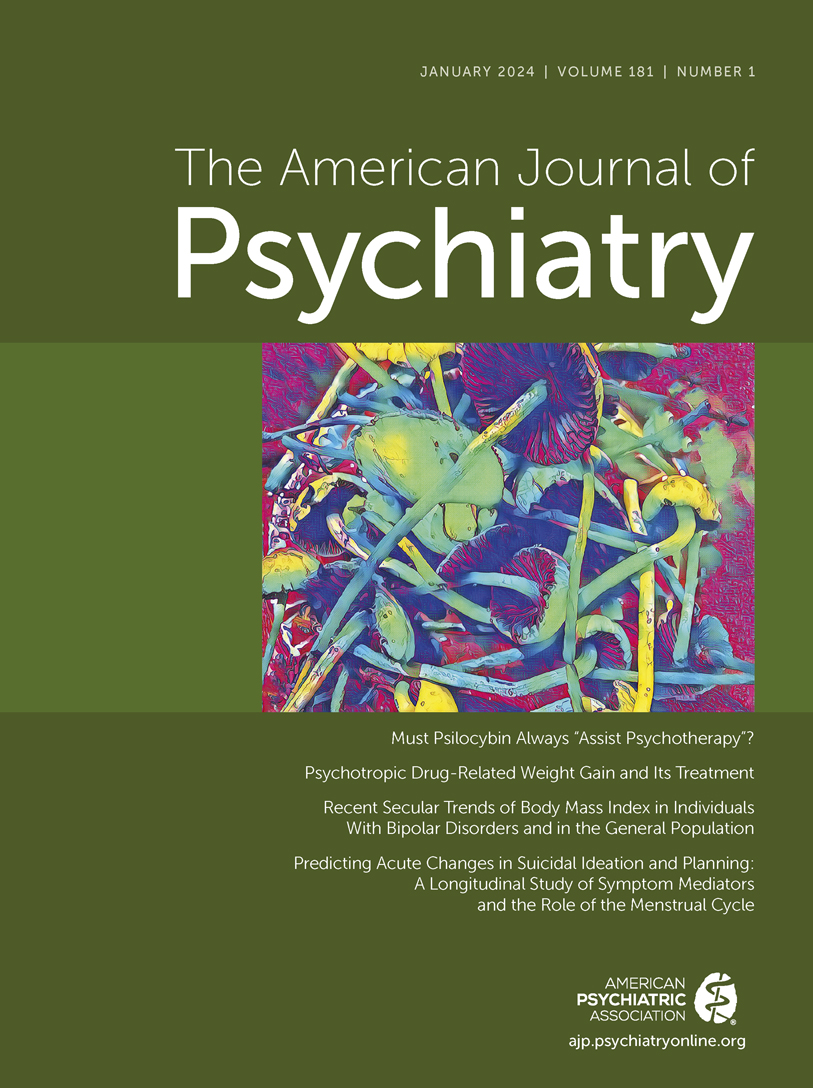Is Poorly Assisted Psilocybin Treatment an Increasing Risk?
To the Editor: In the July 2023 commentary, “Must Psilocybin Always ‘Assist Psychotherapy’?” (1) Goodwin et al. raised interesting questions about paradigms for the therapeutic use of psychedelics. These substances are already applied in diverse ways, from community and relational Indigenous practices (2) to uses deemed “recreational” but which also include self-treatment (3, 4). Thus, while psychedelics indeed need not always “assist psychotherapy,” interactive elements with the substance’s effects have been deemed essential for safety and efficacy across a variety of existing paradigms.
However, the assertions that the intervention used in the phase 2 trial referred to by the authors (5) are “simply ensuring, as is intended, psychological and physical safety” and that it “is applied in a stereotyped way, whatever the drug dose,” as distinct from psychedelic-assisted (psycho) therapy (PAT), where “complex interaction with a therapist during the active drug experience clearly complicates interpretation,” merit further scrutiny. The minimum necessary procedures to prevent harms should be distinguished from PAT. Conversely, there are striking similarities in the guiding principles of the therapist training for this trial (6) with those of PAT models. While not all of these studies have released a manual, some, such as MAPS and Yale, have (7, 8). To the best of our knowledge, the manual for the COMPASS phase 2 trial has not been made publicly available, thereby limiting detailed comparisons. Compounding these issues are potential biases and conflicts of interest involved in developing a proprietary synthetic formulation of psilocybin, which not only raises ethical concerns regarding Indigenous rights (9), but could potentially influence efforts to more easily bring a drug to market by downplaying the role of therapy. Critically, we submit that this role includes optimizing both safety as well as efficacy in relational processes which cannot be treated independently of the drug effect itself (10).
The occurrences of suicidal ideation and related behaviors in the largest clinical trial with a psychedelic to date (5) suggests that careful consideration of the PAT concept may result in safer approaches. It seems reasonable to speculate that higher rates of serious adverse events in the 25 and 10 mg psilocybin groups might have been mitigated with greater emphasis on relational elements during preparation and integration—rather than simply “psychological support.” In addition, cases of boundary violations and abuse (11), correctly highlighted as important issues in PAT (and unfortunately in medicine generally as well [12]), are not, however, justifications for no therapy.
The term “psychedelic-assisted (psycho) therapy” does not intend to “capture the true mechanism of change,” but rather to delineate a holistic approach developed over decades, starting with LSD (13). It creates a therapeutic container to prevent unassisted or poorly assisted drug administration. We understand efforts to simplify processes for regulating systems for drug approval and consequent accessibility, but not at the costs of downplaying the complexity of intrapersonal, interpersonal, and contextual processes. Oversimplification is not clarity, and suggesting effectiveness comes only from drug administration may lead to unintended harms.
1. : Must psilocybin always “assist psychotherapy”? Am J Psychiatry 2024; 181:20–25Abstract, Google Scholar
2. : Ethical principles of traditional Indigenous medicine to guide western psychedelic research and practice. Lancet Reg Health Am 2022; 18:100410Medline, Google Scholar
3. : Classic psychedelics: an integrative review of epidemiology, therapeutics, mystical experience, and brain network function. Pharmacol Ther 2019; 197:83–102Crossref, Medline, Google Scholar
4. : Investigation of self-treatment with lysergic acid diethylamide and psilocybin mushrooms: findings from the Global Drug Survey 2020. J Psychopharmacol 2023; 37:733–748Crossref, Medline, Google Scholar
5. : Single-dose psilocybin for a treatment-resistant episode of major depression. N Engl J Med 2022; 387:1637–1648Crossref, Medline, Google Scholar
6. : Development and evaluation of a therapist training program for psilocybin therapy for treatment-resistant depression in clinical research. Front Psychiatry 2021; 12:586682Crossref, Medline, Google Scholar
7. : A Manual for MDMA-Assisted Psychotherapy in the Treatment of Posttraumatic Stress Disorder, Version 8.1. Santa Cruz, CA, Multidisciplinary Association for Psychedelic Studies (MAPS), 2017. https://maps.org/mdma/mdma-resources/treatment-manual-mdma-assisted-psychotherapy-for-ptsd/Google Scholar
8. : Yale Manual for Psilocybin-Assisted Therapy of Depression, 1st ed. 2020. doi:
9. : Ethical concerns about psilocybin intellectual property. ACS Pharmacol Transl Sci 2021; 4:573–577Crossref, Medline, Google Scholar
10. : Optimizing outcomes in psilocybin therapy: considerations in participant evaluation and preparation. J Affect Disord 2023; 326:18–25Crossref, Medline, Google Scholar
11. : Studying harms is key to improving Psychedelic-Assisted Therapy-participants call for changes to research landscape. JAMA Psychiatry 2023; 80:411–412Crossref, Medline, Google Scholar
12. : Sexual violation of patients by physicians: a mixed-methods, exploratory analysis of 101 cases. Sex Abuse 2019; 31:503–523Crossref, Medline, Google Scholar
13. : Psychedelic-Assisted Psychotherapy: a paradigm shift in psychiatric research and development. Front Pharmacol 2018; 9:733Crossref, Medline, Google Scholar



